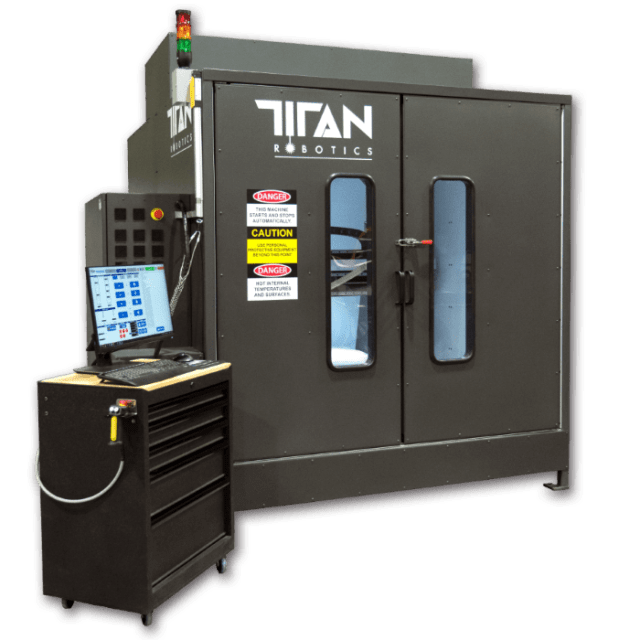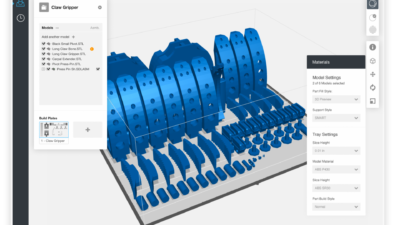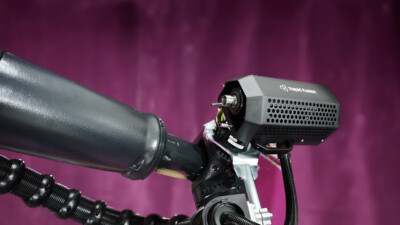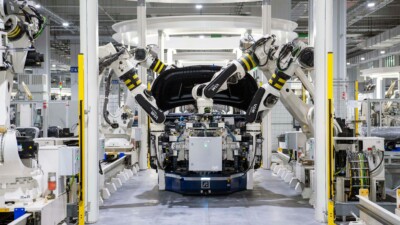Kumovis and Titan Robotics bring their polymer-based extrusion tech to 3D Systems’ health care- and industry-focused portfolio.

On February 23, additive manufacturing (AM) company 3D Systems issued press releases announcing two acquisitions: Kumovis, a German 3D printing startup, and Titan Additive, a Colorado-based builder of industrial 3D printers. 3D Systems did not disclose the terms of either acquisition, but the company expects both deals to close in April 2022.
Both Kumovis and Titan Additive (also known as Titan Robotics) deal in polymer-based extrusion 3D printing, and the two acquisitions reveal 3D Systems’ interest in expanding its portfolio of polymer technology.
3D Systems’ Acquisitions Align with Current Focus on Health Care and Industrial Verticals
3D Systems’ portfolio includes 3D printing hardware, software, and consulting services, and the company’s stated goal is to provide a range of AM solutions for diverse applications. Diverse applications in two areas, that is. In August 2020, two months after the appointment of its current CEO Jeffery Graves, 3D Systems announced a strategic shift to focus on two key verticals: health care and industrial verticals.
The Kumovis and Titan Additive acquisitions represent expansions in both business areas. Kumovis is focused on 3D printing technology for medical implants and devices made with high-performance polymers, while Titan Robotics develops large-format industrial 3D printers and considers itself the market leader in pellet-based polymer extrusion technology.
Why Is 3D Systems Investing in Polymer Extrusion Technologies?
The common denominator of both of 3D Systems’ recent acquisitions is their focus on polymer-based extrusion 3D printing technology. Although one might think of extrusion technologies like fused filament fabrication (FFF, also known as fused deposition modeling, or FDM) as the simple form of 3D printing, the technology has significantly matured since its inception.
3D Systems does not currently offer FFF printers that can scale for industrial applications. The company’s current industrial printer offerings utilize stereolithography (SLA), selective laser sintering (SLS), and multijet printing (MJP) technology. The Titan Robotics acquisition will allow 3D Systems to fill this gap and offer large-format extrusion-based solutions to industrial clients. Kumovis will serve a complementary role in 3D Systems’ health care portfolio.
A Closer Look at Titan Robotics
Founded in 2014 and based in Colorado Springs, Titan Robotics produces a range of industrial extrusion-based 3D printers. These include direct pellet-fed 3D printers, hybrid pellet and filament extrusion systems, and hybrid additive and subtractive systems like the Atlas-HS printer pictured below. This system combines pellet extrusion with a spindle for milling during or after the printing process.

3D Systems highlights that the acquisition of Titan Robotics will be useful for applications in sand casting, tooling, jigs and fixtures, as well as applications in end-use parts. The acquisition also represents 3D Systems’ first investment in pellet-based extrusion technology.
“With the addition of Titan Robotics’ unique extrusion technology, we will be able to address our customers’ need for large build volumes, superior performance, and improved productivity at a significantly lower cost,” commented 3D Systems CEO Jeffrey Graves. Titan Robotics’ printers allow for full-size parts to be manufactured in scales as large as 50″ x 50″ x 72″.
Graves added, “[t]hrough the innovative modular approach of their printers, and the ability to use both pellet and filament product forms in an open architecture with widely available production polymer systems, we believe the adoption rate of industrial 3D printing will continue to accelerate. By combining the engineering and applications expertise of Titan Robotics with the global reach of 3D Systems’ sales, service, and applications teams, we are well-positioned to support our customers across the full range of our markets.”
A Closer Look at Kumovis
Over the past decade, 3D Systems has reported 140,000 patient-specific cases in which the company worked directly with surgeons to find AM-based health care solutions, and more than two million implants and instruments manufactured to date.
“As a pioneer in personalized healthcare solutions, 3D Systems is continuously searching for opportunities to expand our application offerings that will advance healthcare delivery,” said Graves.
Enter Kumovis, whose R1 3D printer is “the world’s first 3D printer with clean room integration,” according to the company, and which “allows for individualizing and producing medical devices at scale.” The fused layer manufacturing (FLM) R1 printer features one filament system and access to eight medical-grade polymers, including PEEK (polyetheretherketone), a high-performance polymer with mechanical properties that are similar to human bone. The Kumovis R1 processes two types of PEEK, implant-grade for long-term use and medical-grade for short-term use such as surgical instruments.

In its press release announcing the acquisition, 3D Systems highlighted the potential of Kumovis technology to help the company expand its offerings for facial and cranial implants, carbon fiber-reinforced PEEK bone plates, and spinal cages.
“The addition of the Kumovis team—their expertise and technology—will be highly synergistic to our medical business model. Our proven ability to deliver regulatory-approved, implantable 3D printed medical devices, personalized to improve patient outcomes, to surgeons around the world through our exceptional channel partners, will help ensure that the Kumovis PEEK-based offerings can be brought to market quickly and effectively,” said Graves.
“Moreover, 3D Systems’ expanding point of care initiatives will be greatly enhanced through the inclusion of Kumovis’ unique ‘integrated clean room’ printing technology, allowing hospitals and other end-users to tailor products on-demand, to meet specific patient requirements in the quickest and most resource-efficient manner,” he added.
3D Systems may be looking to utilize the Kumovis acquisition to cement its leadership in the field of 3D-printed medical devices as the precision medicine field continues to expand.
Looking Forward with Extrusion 3D Printing
3D Systems’ strategy shift in 2020 was a response to concerning revenue reports, which were accompanied by a 20 percent reduction in the company’s workforce to lower operating costs by $100 million by the end of 2021. 3D Systems also indicated that it would divest from any parts of the business that do not align with its health care and industrial focus.
“By organizing our company into two market-focused business units, Healthcare and Industrial Solutions, we have been able to clearly identify the unique technologies, expertise and infrastructure required to be a comprehensive provider of additive manufacturing solutions for key verticals within each of these segments,” Graves said in the company’s 2021 financial report issued in late February 2022.
It looks like Graves’ plan is working. The company has reported a 16.9 percent increase in revenue since 2019 and a 31.8 percent increase since 2020.
With its two latest acquisitions, 3D Systems no doubt hopes to continue this trend. With the Titan Robotics and Kumovis deals expected to close within the next month, it will be interesting to see how their respective technologies will be integrated into 3D Systems’ offerings over the next year.



